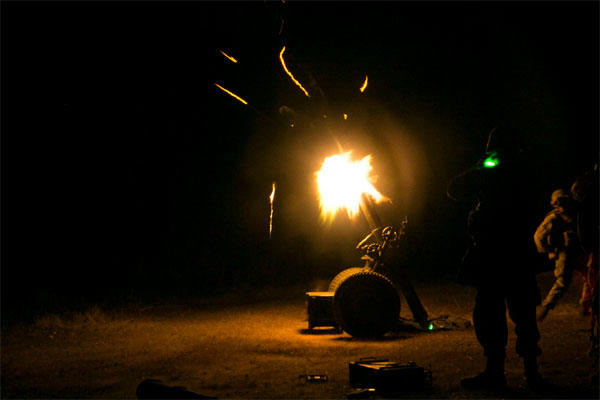The Marine Corps inked $98 million contract this month for a GPS-guided mortar round that officials said will travel twice as far than traditional rounds and with triple the lethality.
This precision extended range munition, or PERM, will be fielded to Marine units in early to mid-2018, said Joe McPherson, the product manager for Fire Support Systems at Marine Corps Systems Command. The 120mm-rounds are designed for the Marines' Expeditionary Fire Support System, a towed mortar that can fit inside an MV-22 Osprey along with the all-terrain vehicle that pulls it. The system can also be stored easily on an amphibious ship and delivered to shore via aircraft or landing craft.
While the EFSS was fielded in the early 2000s, this GPS-guided round has been in development since 2011. The end of the wars in Iraq and Afghanistan reinforced the need to develop a precision mortar round for a system light enough to insert wherever Marines may need to operate in the future, McPherson said. The new round, he said, will also give the Corps the ability to use force in complex urban environments with surgical precision.
"It allows us to ... minimize collateral damage and shoot in a more cluttered environment, in areas where you have to be more cognizant," he said. "Because it's GPS-guided, the very first round is going to hit exactly where you want it to hit."
The round also expands the range of the EFSS from 8 kilometers to 16, or from roughly five miles to ten, McPherson said. In addition to GPS coordinates, they use tail fins to correct in the wind and glide toward the target.
That range and accuracy does come with a price tag. Each of the 35-pound GPS-guided rounds costs about $18,000 McPherson said, compared to about $2,000 for the non-precision rounds. However, he said, the PERM rounds were estimated to cost $27,500 apiece before competition through the Defense Department's Better Buying Power policy drove the price down.
The five-year contract, awarded to Raytheon Missile Systems out of Tucson, Arizona, will deliver about 4,300 rounds to the Marine Corps, including those to be fielded and an allowance for training and testing. The contract was awarded after a competitive demonstration phase, which wrapped up earlier this year.
The Marine Corps will spend the next 15 months conducting a series of tests with factory-made rounds to ensure their safety and stability. Some Marine personnel will participate in those tests, McPherson said.
-- Hope Hodge Seck can be reached at hope.seck@military.com. Follow her on Twitter at @HopeSeck.



























